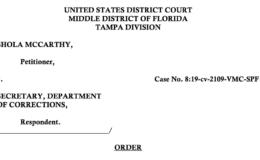Florida Fourth District Recedes From Two Prior Opinions re Miranda Rights
- By : Cbh
- Category : law & order
Florida’s Fourth District Court of Appeal receded from two opinions in 2004 relative to how Miranda rights are given.
For lawyers and the general public alike, there’s always room for a little refresher on Miranda. After all, even the stodgy U.S. Supreme Court was hip enough in 2000 to note that “the [Miranda] warnings have become part of our national culture.”
In Morris v. State of Florida, the defendant was detained and, before being questioned, the officer read from a card the following four rights:
Officer: Okay. All right. So I’m gonna go ahead and read this from this prepared text. All right. Before I ask you any questions, I want to advise you of your constitutional rights.
Officer: You have the right to remain silent; do you understand?
Officer: Okay. Anything you say can be – can be used against you in a court of law; do you understand?
Officer: Okay. You have the right to talk with an attorney present prior to and during any questioning, if you wish; do you understand?
Officer: Okay. All right. If you can’t afford an attorney, one will be appointed to – to represent you before any questioning, if you wish; do you understand?
Officer: Okay. Knowing and understanding each of your rights, as I’ve explained them to you, are you willing to answer my questions without an attorney present?
The defendant agreed that he understood each rights. Later, his lawyer argued that the defendant was not advised that he could stop the interrogation at any time. The question was whether Miranda requires a person to be explicitly advised of that right.
Previously, the Fourth DCA had issued two cases which appear to read that, yes, the detained person is entitled to that right. However, the Fourth DCA concluded that U.S. and Florida Supreme Courts had concluded otherwise. The bottom line in Morris is: “the Miranda warnings in this case sufficiently advised the defendant of his rights, which implicitly include the right to stop questioning.”
The key cases on point are, of course, Miranda v. Arizona (from 1966) and Florida v. Powell (2010). Back in 1990, the Florida Supreme Court decided Brown v. State and held that the “right to cut off questioning is implicit in the litany of rights which Miranda requires to be given to a person being questioned. It is not, however, among those that must be specifically communicated to the person.”
Notably, while the Florida Supreme Court has ruled on this, the U.S. Supreme Court has not. There is a chance that other jurisdictions (or the High Court) might come to a different conclusion.
Image credit: Wikimedia Commons


